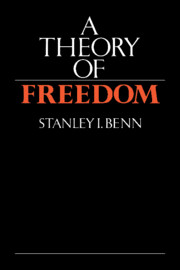Book contents
- Frontmatter
- Contents
- Foreword
- Preface
- Acknowledgments
- 1 Persons and values
- 2 Practical rationality and commitment
- 3 Reasons in conflict: Quandaries and consistency
- 4 Values and objectivity
- 5 Natural personality and moral personality
- 6 The principle of respect for persons
- 7 Freedom of action
- 8 Freedom as autarchy
- 9 Autonomy and positive freedom
- 10 Autonomy, integration, and self-development
- 11 Self-realization, instinctual freedom, and autonomy
- 12 Autonomy, association, and community
- 13 Human rights and moral responsibility
- 14 The principle of privacy
- 15 Interests in privacy
- 16 Conclusion: A semantic theory of freedom
- Notes
- Index
9 - Autonomy and positive freedom
Published online by Cambridge University Press: 04 December 2009
- Frontmatter
- Contents
- Foreword
- Preface
- Acknowledgments
- 1 Persons and values
- 2 Practical rationality and commitment
- 3 Reasons in conflict: Quandaries and consistency
- 4 Values and objectivity
- 5 Natural personality and moral personality
- 6 The principle of respect for persons
- 7 Freedom of action
- 8 Freedom as autarchy
- 9 Autonomy and positive freedom
- 10 Autonomy, integration, and self-development
- 11 Self-realization, instinctual freedom, and autonomy
- 12 Autonomy, association, and community
- 13 Human rights and moral responsibility
- 14 The principle of privacy
- 15 Interests in privacy
- 16 Conclusion: A semantic theory of freedom
- Notes
- Index
Summary
Positive freedom as autonomy
Chapter 7 dealt with what has often been termed “negative freedom.” The analysis centered on an unimpaired chooser deciding between options presented to him under the constraints of nature and those under social constraints, which are taken in context to be as invariable and inevitable as any purely natural impediment to action but not subject to interference by other persons. In the absence of imposed constraints or of interferences with his naturally endowed rational capacities, the person making a choice is taken to be free. Freedom is negative insofar as it amounts to the standardly available options remaining unrestricted by other persons in ways canvassed in Chapter 8, and the capacities for rational decision and the initiation of action that a normal autarchic person would possess remaining unimpaired by the actions of others.
There is, however, an ancient tradition that requires for personal freedom not only that the agent have the capacity for rational decision but also that in general he should use that capacity, that he should actually be motivated by the action commitments of his beliefs, and that these motivating reasons be of a certain sort. This is the account of freedom as positive. It is not, however, the account discussed in Chapter 7, according to which an agent lacks the positive freedom to do something if, even in the absence of imposed restrictions making the option unavailable or ineligible, he is still prevented from doing it because the enabling conditions for doing it are not satisfied.
Information
- Type
- Chapter
- Information
- A Theory of Freedom , pp. 170 - 183Publisher: Cambridge University PressPrint publication year: 1988
